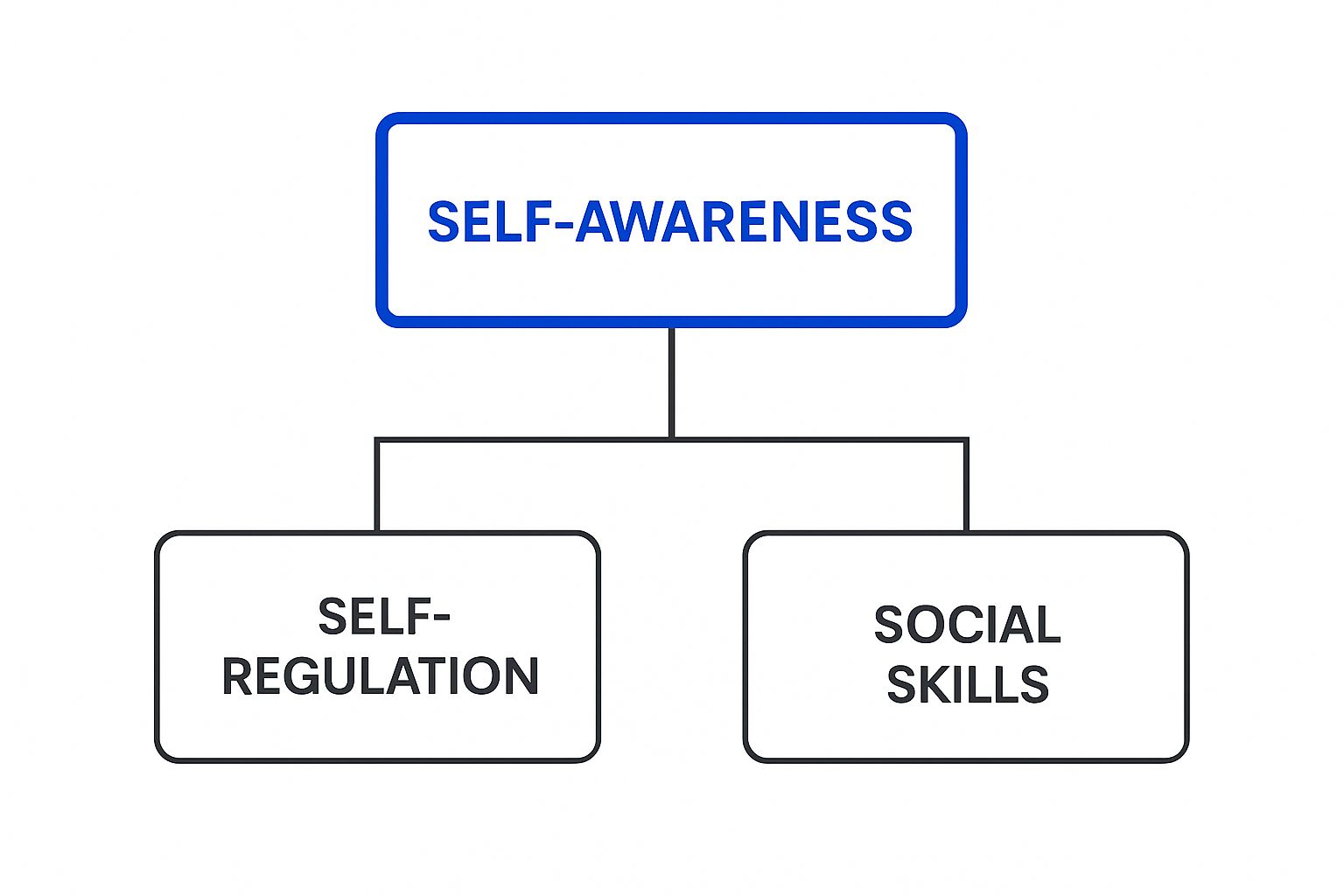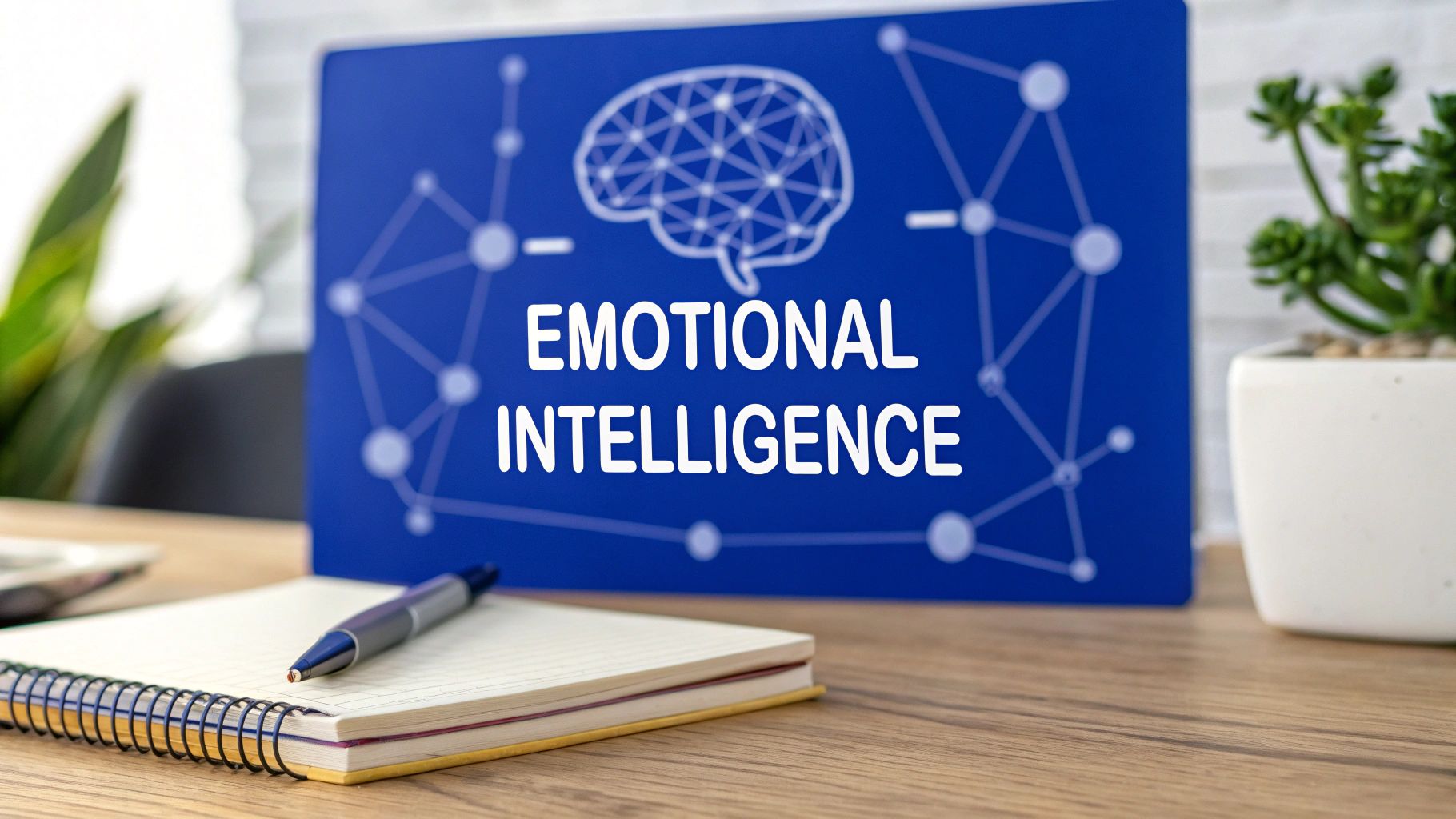Ever met someone who stays cool under pressure, navigates tricky conversations effortlessly, or just seems to get what makes people tick? You've likely seen emotional intelligence (EI) in action. It's often called EQ, or Emotional Quotient.
Emotional intelligence is your ability to recognise, understand, and manage your own emotions. It's also about tuning into the emotions of others, and being able to guide them constructively. This isn't just some fluffy "soft skill"; it's a very real and practical ability that shapes how we act, handle social situations, and make choices that lead to better outcomes.
What Does Emotional Intelligence Actually Look Like?
Think of it as having a highly advanced internal compass. This compass doesn't point north; instead, it helps you read the emotional terrain around you and within yourself. It’s what helps you understand why you feel that knot of anxiety before a big presentation or notice a teammate's reluctance to voice their opinion in a meeting.

But it's not just about awareness. The real power comes from using that information to guide your behaviour. Instead of letting stress get the better of you, you can find ways to manage it. Instead of overlooking your colleague's hesitation, you can create an opening for them to contribute comfortably.
It's Far More Than Just "Being Nice"
There's a common myth that emotional intelligence is simply about being polite or friendly. While kindness is great, true EI goes much deeper. It’s the ability to see the connection between feelings and actions, and to understand the resulting consequences.
Sometimes it means being direct and honest, but doing so with empathy. It’s about delivering tough feedback in a way that helps, not hurts.
This skill is also completely separate from your intellectual ability (IQ). Your IQ is a measure of your reasoning and learning capacity. Your EI, on the other hand, measures how well you handle emotions to build strong relationships and get things done. Both are crucial, but research suggests that EI is responsible for as much as 58% of professional success, no matter what your job title is.
Developing your emotional intelligence isn't just for personal growth; it's a genuine career advantage. Understanding how to apply these skills in diverse social contexts is also key, a concept closely linked to what is cultural intelligence.
Emotional intelligence is critical in building and maintaining relationships and influencing others — key skills that help people throughout their career and wherever they sit in an organisational structure.
To really grasp what emotional intelligence is, it helps to break it down into its core components. These pillars give us a clear framework for mastering ourselves and interacting effectively with the world.
The Core Components of Emotional Intelligence
Let's look at the fundamental pillars that make up emotional intelligence. Understanding these building blocks is the first step toward developing this crucial skill set.
These five elements work together, forming the foundation of both personal well-being and professional achievement.
The Four Pillars of Emotional Intelligence
To really get to grips with emotional intelligence, it helps to break it down into four key skills that are all linked. They aren't standalone traits; think of them as pillars that support one another, starting with what's going on inside you and moving to how you interact with the world. It’s a natural progression: you can't manage what you don't notice, and you can't truly connect with others if you're disconnected from yourself.
These pillars give us a clear roadmap for building our emotional intelligence, beginning with the most fundamental skill of all.
Pillar 1: Self-Awareness
Self-awareness is the absolute bedrock of emotional intelligence. It’s your ability to spot your own emotions, tendencies, and triggers in the moment. This isn't about labelling your feelings as "good" or "bad"—it's simply about acknowledging them honestly as they surface.
Imagine you’ve just received some constructive feedback from your manager. A self-aware person might feel that familiar sting of defensiveness. Instead of lashing out, they can pause and think, "Okay, I feel defensive right now. That’s because I’m proud of this work, and criticism is tough to take on board."
That flash of clarity helps you understand the "why" behind your reaction, giving you that vital moment of choice before you act. Without this foundation, the other pillars just can't stand up.
"It all starts with self-awareness, which is the foundation of EI, and it builds from there. If you’re aware of your own emotions and the behaviors they trigger, you can begin to manage these emotions and behaviors."
The infographic below shows how self-awareness acts as the launching pad for developing the other key emotional intelligence skills.

As you can see, once you can recognise your own emotions, you're in a much better position to regulate them and, in turn, understand what others are feeling.
Pillar 2: Self-Management
Self-management, sometimes called self-regulation, is what you do with that awareness. It’s your ability to control your emotional responses and stay adaptable when things get tough. It's all about choosing how to act, rather than letting your impulses call the shots.
Picture a frustrating email landing in your inbox first thing in the morning. The knee-jerk reaction might be to fire back a sharp reply. Self-management is the skill that allows you to:
- Pause before reacting.
- Consider the fallout from your potential actions.
- Choose a more productive response, like waiting until you’ve cooled off or simply picking up the phone to clear the air.
This skill is absolutely crucial for building trust and keeping things professional, especially when the pressure is on. It’s the difference between reacting emotionally and responding thoughtfully.
Pillar 3: Social Awareness
Once you can understand and manage yourself, you can start to accurately read other people. Social awareness is the ability to pick up on the emotional currents in a room and understand what others are really feeling. This is where empathy comes into its own.
Empathy isn’t about feeling sorry for someone; it’s about making a genuine effort to see things from their perspective. For instance, you might notice a colleague is unusually quiet in a team meeting. Social awareness helps you infer that they might be feeling overwhelmed or worried about a project, rather than just assuming they're not interested.
To really get this, it’s vital to work on understanding the role of empathy in emotional intelligence, as it’s the bridge between simply seeing an emotion and truly connecting with it.
Pillar 4: Relationship Management
The final pillar, relationship management, pulls everything together. It’s about using your awareness of your own emotions and those of others to navigate interactions successfully. This is where you inspire, influence, and connect with people in a meaningful way.
This skill shows up in several key actions:
- Giving clear feedback with tact and thought.
- Resolving conflicts constructively by looking for common ground.
- Working together effectively as part of a team.
- Inspiring and guiding others towards a common goal.
Let’s go back to our quiet colleague. Relationship management is what happens next. You might pull them aside later and ask, "You seemed a bit concerned in the meeting. Is everything alright with the project deadline?" This simple act can build trust, open up communication, and ultimately make your working relationship stronger. It’s how emotional insight becomes positive, productive action.
Why Emotional Intelligence Matters at Work
Your technical skills and qualifications might get you in the door, but it’s your emotional intelligence (EI) that truly determines how well you navigate the rooms you enter. In any workplace, EI is the invisible thread that weaves a good team into a great one, and turns a capable manager into an inspiring leader. It’s the driving force behind effective collaboration, clear communication, and the resilience that keeps things moving forward.
An emotionally intelligent colleague doesn't just manage their own workload; they lift the entire team. They're the ones who can offer and accept feedback without getting defensive, skilfully handle tricky team dynamics, and stay level-headed when faced with sudden changes or intense pressure.

This ability to connect and communicate well makes the workplace not just more productive, but healthier and more innovative. When people feel understood and psychologically safe, they’re far more willing to share bold ideas, own up to mistakes, and pull together to find the best solutions.
The Real Cost of Low Emotional Intelligence
When emotional intelligence is missing from the equation, the consequences ripple outwards. A lack of EI is often the root cause of persistent misunderstandings, simmering conflicts, and a nosedive in team morale. This isn't just a "culture problem"—it directly hits business performance, leading to higher staff turnover, reduced productivity, and a toxic work environment.
Let’s break it down into real-world scenarios:
- Poor Conflict Resolution: A manager with low EI might turn a minor disagreement into a major source of resentment. In contrast, a leader with high EI can mediate effectively and help everyone find common ground.
- Ineffective Feedback: When feedback is delivered without a shred of empathy, it feels like an attack. This causes employees to shut down and become defensive rather than seeing an opportunity to grow.
- Resistance to Change: Teams that lack social awareness often struggle to adapt. New initiatives are met with suspicion and fear instead of being seen as an opportunity.
The financial toll of ignoring these skills is genuinely staggering. A recent survey found that while 97% of UK employers believe EI is vital for growth, businesses are losing an estimated £22 billion every year because they aren’t investing in these exact capabilities. You can dig deeper into the business impact of emotional intelligence skills on virtual-college.co.uk.
A Competitive Advantage in Today's Market
At the end of the day, investing in emotional intelligence is no longer a soft "nice-to-have"—it's a core business strategy. Organisations that actively nurture these skills are building a powerful and sustainable competitive advantage.
Emotionally intelligent workplaces are simply better equipped to handle stress, navigate complex client relationships, and foster a culture of loyalty and innovation. This translates directly into a more engaged workforce and a healthier bottom line.
In a world where technical skills can become obsolete overnight, the human ability to connect, empathise, and collaborate remains a timeless asset. The companies that grasp this are the ones that will attract and keep top talent, building resilient teams ready to thrive through any challenge. Emotional intelligence is what transforms a group of individuals into a cohesive, high-performing force.
How Emotional Intelligence Shapes Great Leaders
Great leadership isn't just about managing budgets and directing tasks. At its heart, it’s about inspiring people to bring their best selves to work, and that's where emotional intelligence becomes a game-changer. Leaders with high EI cultivate psychological safety—they build environments where teams feel secure enough to collaborate, innovate, and even fail without fear.
They don't just give orders; they forge connections. By tuning into the emotional undercurrents of their team, these leaders can offer the right support at the right time, communicate clearly when things get stressful, and reframe conflicts as chances to grow stronger together.
Responding Versus Reacting in a Crisis
Imagine a critical project suddenly derails. A manager with low emotional intelligence might react instantly with frustration, pointing fingers and piling pressure onto an already frazzled team. Their own anxiety colours their decisions, and that negativity quickly infects everyone, sinking morale.
An emotionally intelligent leader, however, responds with empathy and composure. They start by acknowledging the team's stress, then calmly steer the conversation towards solutions. This approach doesn't just solve the immediate problem; it builds trust and empowers the team for the long haul.
An emotionally intelligent leader calms the storm, whereas a reactive manager often becomes part of it. This ability to self-regulate under pressure is what separates good managers from truly great leaders.
Building these skills is a core part of modern leadership. Thankfully, there are fantastic resources available, including specialised virtual leadership training designed to develop these exact capabilities.
The Link Between Leadership and Wellbeing
The ripple effects of emotional intelligence also benefit the leaders themselves. In high-pressure roles, managing your own stress is vital for staying effective and avoiding burnout. This is a massive challenge for many managers today.
Recent research found that a startling 59% of UK managers feel they don't get the support they need to handle their job's demands, and 65% feel ill-equipped to manage change. The connection to EI is clear: leaders with higher emotional intelligence report 25% greater wellbeing, showing how these skills act as a vital buffer. You can read more about the impact of EI on leadership wellbeing at changing-point.com.
Ultimately, a leader's emotional state sets the tone for the entire company. When leaders are better at handling their own stress, they are far more effective at preventing burnout in their teams. This leads directly to lower staff turnover and a healthier, more resilient workplace for everyone.
Practical Ways to Develop Your Emotional Intelligence
Think emotional intelligence is something you’re either born with or you’re not? Think again. It’s not a fixed trait, but a skill you can actively build and strengthen over time. Improving your EQ isn’t about a complete personality transplant; it’s about committing to small, consistent habits that foster greater awareness and control.
The whole process starts by looking inwards. After all, you can't manage emotions you don't even realise you're having.
Start with Self-Awareness
Getting a clear picture of what’s happening inside your own head is the bedrock of emotional intelligence. One of the simplest, yet most powerful, ways to do this is through a bit of daily reflection.
- The 5-Minute Journal: At the end of the day, just take five minutes to write down your thoughts. Ask yourself a few simple questions: What was the toughest part of my day? What emotion did that bring up? And how did I react? This quick habit creates an incredible feedback loop, helping you draw a line between events and your emotional responses.
This isn’t about judging yourself, it’s purely about observation. Soon enough, you'll start spotting patterns in what triggers you and how you react, which is the first real step toward making a conscious change.
Master Your Reactions with Self-Management
Once you can put a name to your emotions, the next challenge is to manage them. This is where you shift from automatically reacting on impulse to consciously choosing how you want to respond.
The goal of self-management is to create a space between a feeling and an action. In that space lies your power to choose a more constructive path.
A fantastic technique for this is what I call 'The Productive Pause'. When you feel a strong emotion bubbling up—like frustration or anger—make a conscious effort to stop before you speak or act. Take a deep breath, count to ten, or even physically step away from the situation for a minute. This tiny interruption breaks the grip of that initial impulse and gives your logical brain a chance to get back in the driver's seat.
If you're looking to dive deeper, this comprehensive guide on how to build emotional intelligence is packed with valuable insights.
Sharpen Your Social Skills
Emotional intelligence isn’t just about you; it’s about how you connect with everyone else. Boosting your social awareness really comes down to listening better and becoming genuinely curious about what makes other people tick.

Try having 'Curiosity Conversations'. Next time you’re talking with a colleague, fight the urge to plan your response while they’re still talking. Instead, just listen. Make it your only goal to understand where they’re coming from. Ask open-ended questions like, "Can you tell me more about that?" or "How did that make you feel?"
This simple shift turns conversations from a battle of monologues into a genuine exchange, which is how you build real trust and stronger relationships. It’s no surprise that this is a core part of effective communication skills training for employees, as it makes entire teams work better together.
These skills are also your best defence against stress. In the UK, 20% of adults feel stressed more often than not, with women reporting feeling stressed around 10 days a month compared to seven for men. This carries a hefty price tag for businesses, with stress-related illnesses costing employers roughly £5 billion each year. By building your emotional intelligence, you're also building resilience to handle these pressures head-on.
Got Questions About Emotional Intelligence? Let's Unpack Them
As we dig into what emotional intelligence is all about, a few common questions tend to pop up. Let's tackle them head-on to clear up any confusion and make sure the core ideas really stick.
Is Emotional Intelligence Just a Different Name for IQ?
Not at all. Think of them as two different, but equally important, toolkits. Your Intelligence Quotient (IQ) is all about your cognitive horsepower – things like logical reasoning, learning new things, and connecting the dots. Your Emotional Quotient (EQ), on the other hand, is about your ability to read, understand, and manage emotions, both in yourself and in the people around you.
Here’s a practical way to see the difference: your IQ helps you crunch the numbers for a complex project, but it’s your EQ that allows you to rally a stressed-out team to get behind it. While both are incredibly useful, some studies suggest that emotional intelligence accounts for as much as 58% of professional success, no matter what your job title is.
Can You Genuinely Improve Your Emotional Intelligence?
Absolutely. This is probably the best news about EI – it’s not something you’re stuck with. It's a skill, or rather a collection of skills, that you can build on and strengthen throughout your entire life. Just like going to the gym to build a muscle, improving your EI takes consistent effort and a bit of self-awareness.
You can actually forge new neural pathways by practising small, daily habits. Things like taking a moment to reflect on your day, pausing before you react in a tense conversation, or really focusing on what someone is saying (not just waiting for your turn to talk). With time and practice, these conscious choices start to become second nature, making you genuinely better at handling your own emotions and connecting with others.
Does EI Just Mean You Have to Be "Nice" All the Time?
This is a huge misconception. While being empathetic and kind are certainly parts of emotional intelligence, they don't tell the whole story. EI is much deeper than just being polite or avoiding conflict. It's about being effective, not just agreeable.
Emotional intelligence is also what gives you the ability to navigate a difficult conversation, give feedback that actually helps someone grow, or hold your ground respectfully when you disagree. It’s about being honest and direct, but in a way that considers the emotional reality of the situation.
Think about a manager who needs to address poor performance. A "nice" but ineffective manager might avoid the conversation altogether. An emotionally intelligent leader, however, can be clear and firm about the required improvements while also being supportive, motivating the person to do better instead of leaving them feeling crushed. That takes a lot more skill than just being nice.

